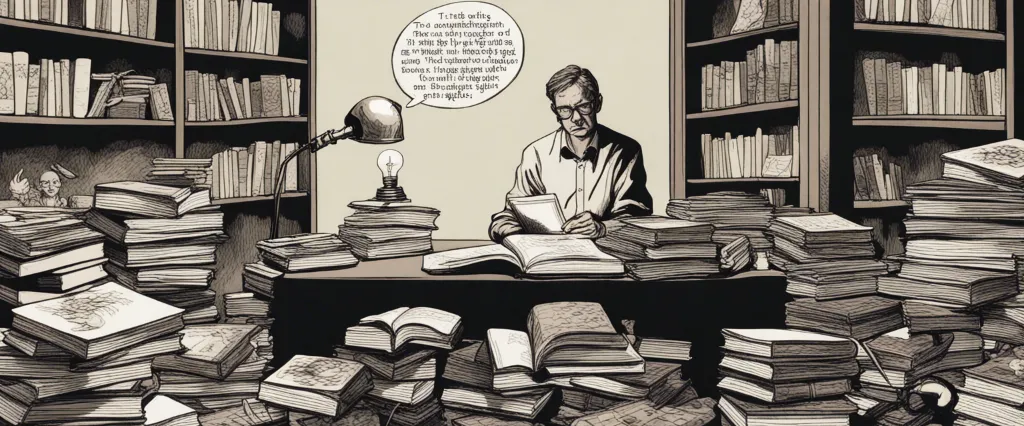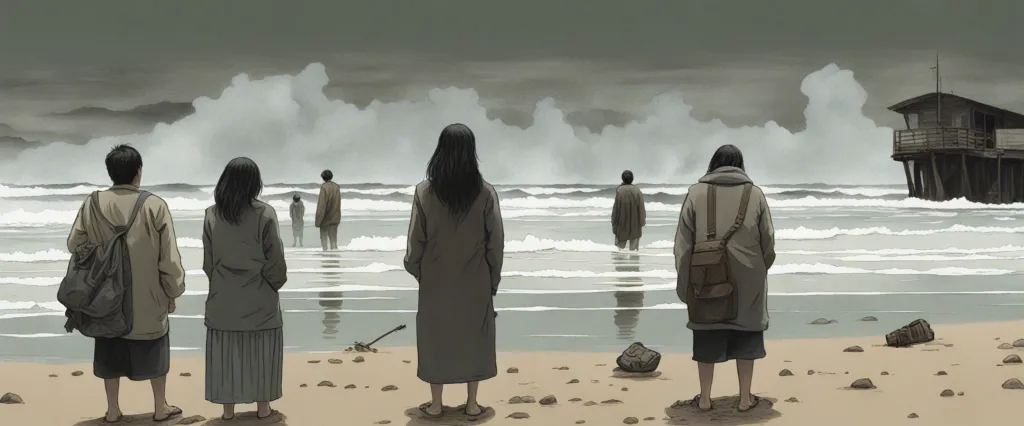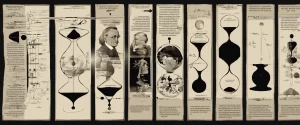——Ghosts of the Tsunami by Richard Lloyd Parry & The Death of Expertise by Thomas M. Nichols

In an era defined by constant societal shifts and global crises, the pursuit of knowledge and expertise has become increasingly important. It is within this context that we delve into a comparative study of two thought-provoking books that explore vastly different yet interconnected aspects of our world today: Richard Lloyd Parry’s “Ghosts of the Tsunami” and Thomas M. Nichols’ “The Death of Expertise.”
Ghosts of the Tsunami” takes us on a deeply moving journey into the catastrophic consequences of the 2011 Tohoku earthquake and tsunami in Japan. Parry, a renowned journalist, immerses readers in the aftermath, revealing the profound emotional and psychological impact that this natural disaster had on the survivors. With painstaking detail, Parry explores the collective and individual grieving processes, shedding light on the haunting presence that lingers long after the physical devastation subsides. Through his meticulous reporting, he captures the indomitable spirit of a community grappling with trauma and searching for solace amid unfathomable loss.
In stark contrast, “The Death of Expertise” by Thomas M. Nichols offers a penetrating analysis of the erosion of trust in experts and the rise of an anti-intellectual sentiment in our modern society. Nichols, a renowned professor and expert in national security affairs, tackles the pressing issue of a world where knowledge is often dismissed or disregarded in favor of personal opinions or unfounded beliefs. With profound insight and a touch of urgency, Nichols confronts the consequences of this distrust, questioning the long-term implications for public policy, scientific advancements, and the overall well-being of societies worldwide.
While these two books might appear to confront entirely different realms of human experience, the juxtaposition of their perspectives highlights a crucial common thread. Both Parry and Nichols invite readers to reflect on the value of expertise and knowledge in confronting the complex challenges of our time. Through their meticulous research and compelling storytelling, they compel us to consider the consequences of dismissing expertise or overlooking the voices of those affected by dramatic events.
By exploring these books side by side, we aim to illuminate the intersecting themes of trauma, resilience, knowledge, and the search for meaning within a rapidly changing world. Within the pages of “Ghosts of the Tsunami” and “The Death of Expertise,” we witness the power and weight of personal experience alongside the importance of trust in informed authorities. Together, they offer a thought-provoking analysis of the human condition and the evolving dynamics of our society.
As we embark on this comparative study, we invite you to delve into the depths of these remarkable works, to question our assumptions, and to seek a deeper understanding of our world and our place within it. Through this exploration, we set out on a journey to appreciate the multifaceted nature of truth, wisdom, and the eternal quest for knowledge that unites us all.
Brief Summary of Two Books
Ghosts of the Tsunami by Richard Lloyd Parry
Ghosts of the Tsunami” by Richard Lloyd Parry is a gripping non-fiction book that delves into the devastating aftermath of the 2011 Tohoku earthquake and tsunami in Japan. The book focuses specifically on a small coastal town called Okawa, which was obliterated by a wall of water and suffered a disproportionately high number of casualties. Parry explores the personal stories of those affected, including parents who lost their children and struggles of the survivors trying to rebuild their lives.
The core of the narrative revolves around a haunted school, Okawa Elementary, where numerous children were trapped and perished during the disaster. Parry interviews grieving parents, teachers, and other witnesses to piece together the events that unfolded that day and the emotional toll it took on the community. He delves into Japan’s deeply ingrained cultural beliefs about the afterlife, as many families believe their lost children still haunt the school.
The author also explores the failures of the Japanese government and the media in adequately warning and protecting its citizens. He delves into the complicated bureaucratic response, which prioritized economic and political considerations over the immediate needs of the affected population. Parry’s investigative reporting highlights the systemic issues within Japan’s society and governance that exacerbated the tragedy.
“Ghosts of the Tsunami” is a poignant exploration of grief, resilience, and the human capacity to find hope amidst unimaginable tragedy. It provides a sobering account of the 2011 disaster, shedding light on the individual and collective healing process of a community forever scarred by the Ghosts of the Tsunami.
The Death of Expertise by Thomas M. Nichols
“The Death of Expertise” by Thomas M. Nichols explores the decline of trust in experts and the consequences of this phenomenon on societies. Nichols argues that in the age of the internet and social media, everyone has easy access to information, making them believe they are capable of being experts on any subject. This belief, combined with the rejection of science and intellectual authority, has led to a dangerous situation where opinions and expertise are given equal weight, eroding the value of genuine expertise. Nichols analyzes the causes and effects of this problem, highlighting the role of technology, education, and media in perpetuating the death of expertise. He warns against the dangers of public decision-making being influenced by baseless opinions and irrational beliefs, while emphasizing the importance of acknowledging and trusting true experts.
Comparison between Two Books

Similarities in Social Documentary
Parallel Ghosts of the Tsunami by Richard Lloyd Parry and The Death of Expertise by Thomas M. Nichols share several similarities in terms of their approach to social documentary. While the subject matter of these books is vastly different, both authors employ elements of social documentary to shed light on important issues and bring forth a deeper understanding of society.
1. Extensive research: Both Parry and Nichols extensively research their respective subjects, drawing from first-hand accounts, academic sources, and historical context. They leave no stone unturned in their quest for thorough documentation and include ample references to support their arguments and findings.
2. Personal narratives: Social documentary often relies on personal narratives to humanize larger events or ideas. Parry and Nichols skillfully incorporate personal stories throughout their books. Parry recounts the stories of individuals directly affected by the devastating tsunami in Japan, providing a poignant and emotional perspective. Nichols, on the other hand, includes personal anecdotes to illuminate the consequences of the erosion of expertise in modern society.
3. Objectivity: Both authors strive to maintain objectivity in their presentation of facts and events. Parry and Nichols refrain from outright bias or personal opinions, opting instead to present the information in a balanced manner. By presenting the information objectively, they allow readers to form their own opinions and conclusions.
4. Societal impact: Both books highlight broader social issues and their impact on society. Parry examines how the tsunami exposed vulnerabilities and inequities within Japanese society, while Nichols focuses on the decline of expertise and its influence on politics and public policy. By peeling back the layers and exposing these issues, they prompt readers to critically reflect on the world around them.
5. Collaborative effort: Social documentary often involves collaboration with various individuals or communities to gather information. Parry and Nichols collaborate with different sources, including survivors, experts, and professionals in their respective fields. This collaborative effort lends credibility to their research and enriches the overall narrative.
In conclusion, although the topics of Ghosts of the Tsunami and The Death of Expertise differ significantly, both books employ the techniques of social documentary. Through extensive research, personal narratives, objectivity, examination of societal impact, and collaborations, Parry and Nichols effectively document important social issues, urging readers to engage with these topics on a deeper level.
Divergences in Social Documentary
Ghosts of the Tsunami by Richard Lloyd Parry and The Death of Expertise by Thomas M. Nichols approach the concept of social documentary from different angles. While both books deal with real-life events and attempt to shed light on various aspects of society, they diverge in terms of subject matter and focus.
In Ghosts of the Tsunami, Parry explores the aftermath of the devastating 2011 earthquake and tsunami that hit Japan. The book examines not only the physical destruction caused by the natural disaster but also delves into the psychological and emotional impact it had on the survivors. Parry’s approach to social documentary is deeply empathetic and personal. He vividly portrays the grief, trauma, and resilience of the people affected, going beyond surface-level analysis to capture the human experience and the lasting effects on Japanese society.
On the other hand, The Death of Expertise takes a more broad-spectrum view of social documentary. Nichols analyzes the erosion of expertise in modern society, arguing that people have become less trusting of experts and more inclined to reject specialized knowledge in favor of their own opinions or the opinions of other non-experts. Nichols explores the consequences of this trend, such as the rise of anti-intellectualism and the rejection of evidence-based decision-making. His approach is more analytical and critical, highlighting how this decline in respect for expertise impacts various aspects of society, from education to politics.
While Ghosts of the Tsunami focuses primarily on a specific event and its aftermath, The Death of Expertise takes a broader lens on societal trends. Parry’s book can be seen as a microcosm of the aftermath of a major catastrophe, examining the unique challenges faced by the affected community. Conversely, Nichols’ work zooms out to address a larger societal phenomenon that extends beyond any particular event.
In conclusion, while both books share an interest in social documentary, Ghosts of the Tsunami by Richard Lloyd Parry dives into the personal and emotional aftermath of a specific disaster, while The Death of Expertise by Thomas M. Nichols examines the broader trend of distrust in expertise in contemporary society. Their divergence lies in the scope of their analyses, with Parry focusing on a localized event, and Nichols exploring a more widespread societal issue.

Conclusion
Both “Ghosts of the Tsunami” by Richard Lloyd Parry and “The Death of Expertise” by Thomas M. Nichols offer valuable insights and perspectives. The worthiness of reading each book depends on your personal interests and what you are looking to gain from your reading experience.
“Ghosts of the Tsunami” provides a deeply moving account of the devastating 2011 tsunami in Japan. Richard Lloyd Parry delves into the experiences and stories of various individuals affected by the disaster, exploring the cultural and psychological aftermath. This book is an immersive and emotionally powerful exploration of a tragedy and its impact on a community.
On the other hand, “The Death of Expertise” by Thomas M. Nichols examines the increasing rejection of expertise in contemporary society. Nichols argues that this rejection negatively affects important decision-making processes and societal progress. This book presents an analysis of the skepticism towards experts and the potential consequences of this trend, offering valuable insights into the state of modern society.
Ultimately, both books offer thought-provoking content that engages with important topics. If you are interested in tragedies, the human experience, and exploring the aftermath of a disaster, “Ghosts of the Tsunami” may be the more suitable choice. On the other hand, if you are interested in understanding the current state of expertise and its effects on decision-making, “The Death of Expertise” would be a worthwhile read.
Consider your interests and what you hope to gain from your reading experience to determine which book aligns more with your preferences. Both books have their merits and offer unique perspectives on different topics.


